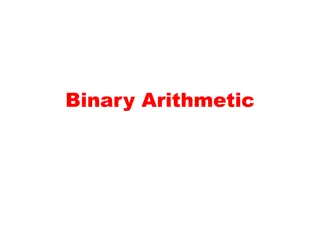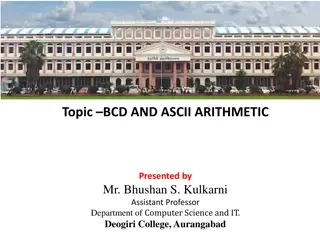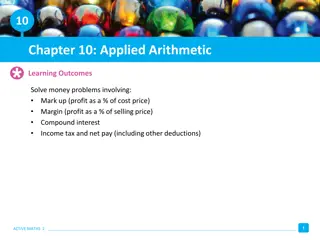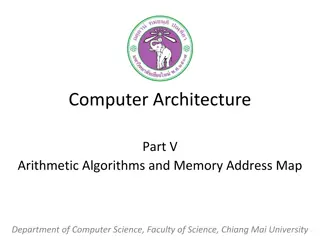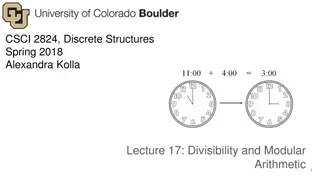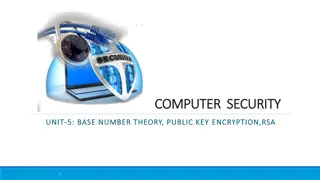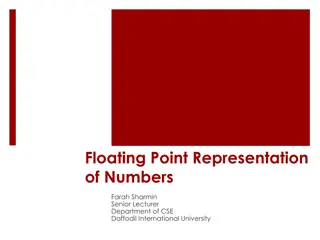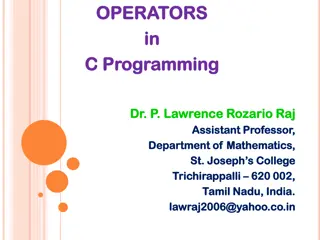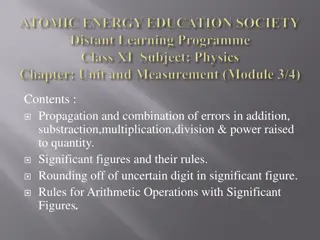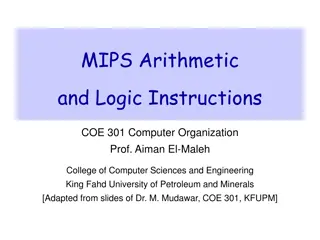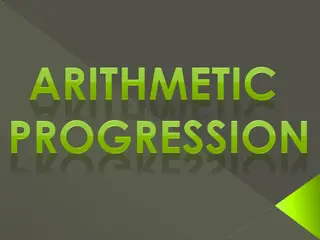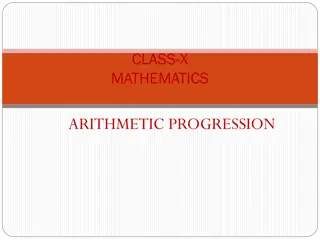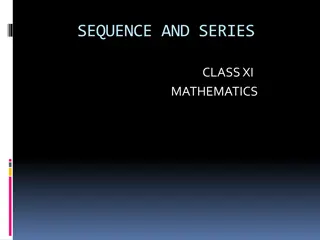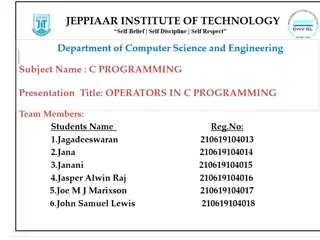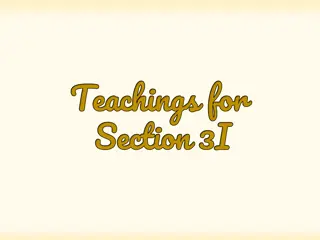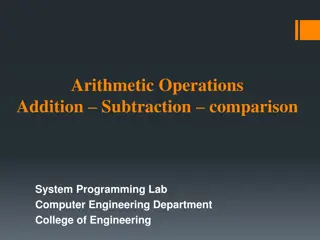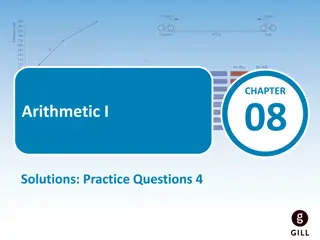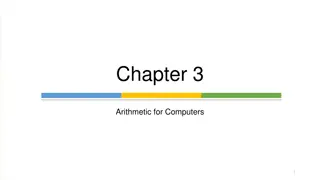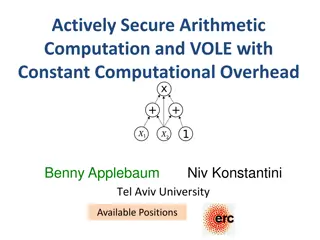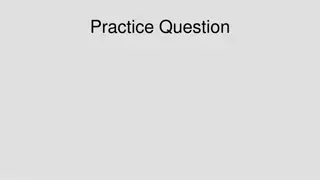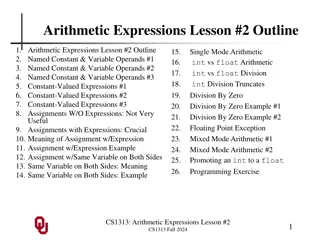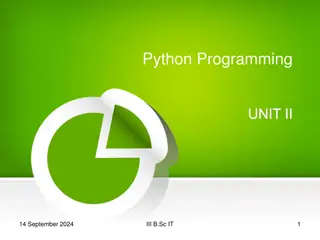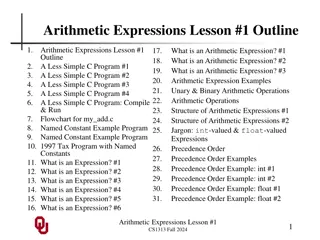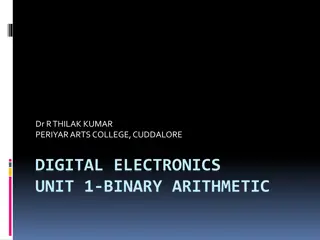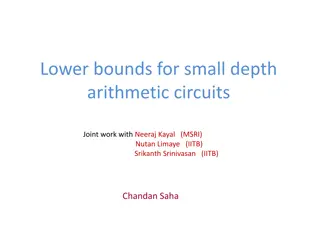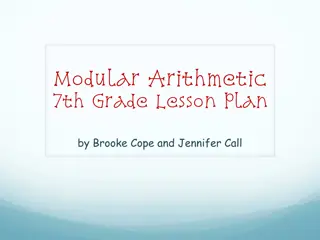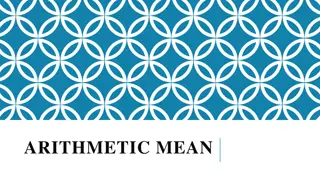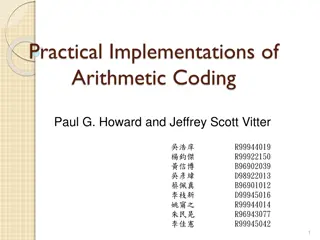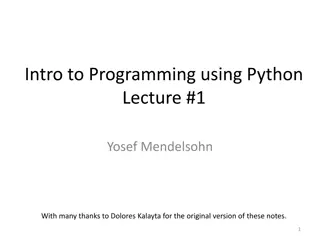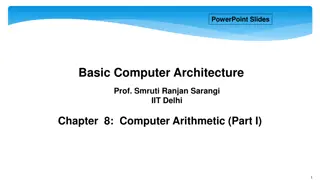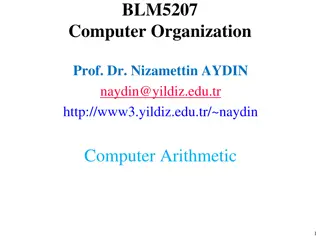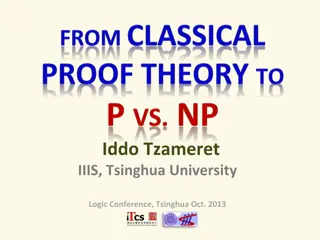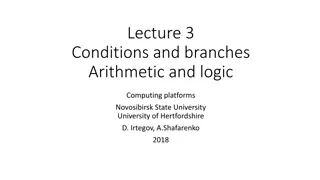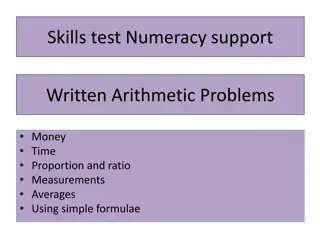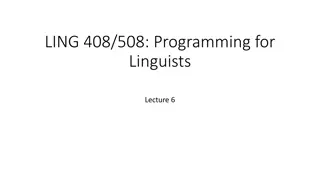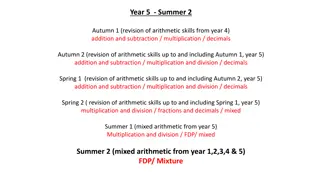Cognitive Load Classification with 2D-CNN Model in Mental Arithmetic Task
Cognitive load is crucial in assessing mental effort in tasks. This paper discusses using EEG signals and a 2D-CNN model to classify cognitive load during mental arithmetic tasks, aiming to optimize performance. EEG signals help evaluate mental workload, although they can be sensitive to noise. The
0 views • 19 slides
Understanding Modular Arithmetic and Rings in Mathematics
Exploring the concepts of modular arithmetic and rings in mathematics, including properties, operations, and examples. Learn how modular arithmetic simplifies computations and how rings define closed mathematical systems with specific laws and identities.
6 views • 14 slides
Binary Arithmetic
Explore the world of binary arithmetic, including addition, subtraction, multiplication, and division. Learn the rules and examples of performing basic binary operations efficiently. Understand how to convert binary numbers to decimal equivalents. Enhance your understanding with visual explanations
0 views • 51 slides
Understanding BCD and ASCII Arithmetic in 8086 Assembly Language
BCD (Binary-Coded Decimal) and ASCII (American Standard Code for Information Interchange) are key concepts in 8086 assembly language for numerical and character manipulations. BCD Arithmetic involves addition and subtraction techniques using instructions like DAA and DAS. The adjustment instructions
1 views • 21 slides
Solving Money Problems with Arithmetic
This chapter focuses on applied arithmetic concepts such as calculating mark-up, margin, compound interest, income tax, and net pay. It covers topics like percentages, income, deductions, and income tax rates in Ireland. Detailed examples on calculating tax payable, deductions, and net pay are provi
0 views • 12 slides
Computer Architecture: Arithmetic Algorithms and Memory Address Mapping
Exploring the intricate world of computer architecture, this study delves into the realms of signed-magnitude addition and subtraction, multiplication operations, and memory address mapping for microprocessors. It uncovers the hardware components involved in these operations, such as registers, flip
1 views • 24 slides
Understanding Divisibility and Modular Arithmetic in Discrete Structures
This lecture discusses the concepts of divisibility and modular arithmetic in the context of discrete structures. It covers definitions, notation, and examples of divisibility by integers, including proving properties such as the divisibility of products and consecutive integers. Through practical e
1 views • 43 slides
Introduction to Computer Security and Number Theory
Explore the fundamental concepts of computer security, public key encryption, RSA encryption, and modular arithmetic in number theory. Understand properties of the modulo operator and learn how modular arithmetic exhibits specific mathematical properties.
0 views • 55 slides
Understanding Floating Point Representation of Numbers
Floating point representation is crucial in computer arithmetic operations. It involves expressing real numbers as a mantissa and an exponent to preserve significant digits and increase the range of values stored. This normalized floating point mode allows for efficient storage and manipulation of r
0 views • 12 slides
Understanding Arithmetic Operators in C Programming
C programming language provides various arithmetic operators such as addition, subtraction, multiplication, division, and modulo division. Integer division truncates any fractional part, while modulo division produces the remainder of an integer division. When operands in an arithmetic expression ar
1 views • 18 slides
Interactive Online Lessons and Arithmetic Challenges
Access online lessons, engage in times table challenges, and test your arithmetic skills with various math problems. Practice forming equations and enhance reasoning abilities through a series of interactive tasks and questions. Improve knowledge and problem-solving skills in a structured learning e
0 views • 22 slides
Error Propagation and Significant Figures in Arithmetic Operations
Understanding how errors propagate in addition, subtraction, multiplication, division, and raising to power operations, along with the significance of significant figures and rules for arithmetic operations involving them. Significant figures play a crucial role in determining the precision of measu
2 views • 12 slides
Overview of MIPS Arithmetic and Logic Instructions in COE 301
MIPS Architecture consists of R-Type and I-Type instruction formats for arithmetic, logical, shift, and immediate constant operations. It includes a variety of general-purpose registers and specific units for execution, floating-point operations, and memory handling. The presentation outlines the st
2 views • 29 slides
Understanding Arithmetic Progression (AP) Concepts
Arithmetic Progression (AP) is a sequence where each term is derived by adding a fixed number to the previous term. This concept is explored through common difference, identifying terms in an AP, finding value of unknowns, sum of terms formula, and derivations. Examples and problems demonstrate the
1 views • 14 slides
Understanding Arithmetic Progressions in Mathematics
Explore the concept of arithmetic progressions (AP) in mathematics by understanding sequences, series, and how to identify and work with APs. Learn about common differences, nth terms, sum of terms, and practical applications of AP in daily life. Discover methods to verify if a given sequence is in
0 views • 34 slides
Understanding Sequences and Series in Mathematics
Sequences and series are fundamental concepts in mathematics, with sequences consisting of terms denoted as a1, a2, a3, ... and series involving the sum of terms in arithmetic and geometric progressions. Learn about arithmetic progression, geometric progression, terms, and formulas for finding sums
1 views • 11 slides
Understanding Arithmetic, Increment, and Decrement Operators in C Programming
Explore different types of operators in C programming like arithmetic operators for mathematical operations, increment and decrement operators for changing operand values, assignment operators for assigning values to variables, and relational operators for checking relationships between operands. Se
1 views • 14 slides
Understanding Arithmetic Sequences and Series in Business Profits
Learn how to model and calculate business profits using arithmetic sequences and series. Explore a scenario where profits increase annually until reaching a constant level, and see the impact of different growth rates on financial projections. Understand the implications of using mathematical models
0 views • 8 slides
Overview of 8086 Assembly Language Arithmetic Operations
The 8086 assembly language provides instructions for arithmetic operations such as addition, subtraction, and comparison. These operations are essential for manipulating data in memory and registers. The instructions support various operand types, including registers, memory locations, and immediate
0 views • 24 slides
Arithmetic Practice Questions and Currency Conversions
Practice questions involving currency conversions and arithmetic calculations are provided in the content. Various scenarios are presented, such as determining costs in different currencies, finding exchange rates, and comparing prices in different countries based on exchange rates. The questions re
1 views • 25 slides
Understanding Arithmetic Operations for Computers
The chapter delves into the fundamentals of arithmetic for computers, covering operations on integers, dealing with overflow, handling floating-point real numbers, and more. It explores addition, subtraction, multiplication, and division in detail, showcasing examples and techniques for efficient co
4 views • 18 slides
Actively Secure Arithmetic Computation and VOLE Study
Exploring actively secure arithmetic computation and VOLE with constant computational overhead at Tel Aviv University. Understanding how functions are represented in secure computation using arithmetic circuits over boolean circuits. Efficiently evaluating arithmetic circuits over large finite field
0 views • 36 slides
Math Practice Questions for Arithmetic Operations
Practice your math skills with a series of questions involving addition, subtraction, and multiplication. Challenge yourself with varying levels of difficulty and enhance your arithmetic abilities through interactive visual aids.
0 views • 52 slides
Understanding Arithmetic Expressions and Constants in Programming
Learn about the importance of named constants and variables in arithmetic expressions, how to perform assignments with and without expressions, and the implications of working with integer and floating-point arithmetic in programming. Explore examples and exercises to enhance your programming skills
0 views • 26 slides
Python Programming Expressions and Arithmetic Operators Overview
Learn about expressions, arithmetic operators, value combinations with operators, operator precedence and associativity in Python programming. Understand arithmetic operations, variable assignments, common errors, and examples highlighting key concepts such as unary and binary operators. Enhance you
0 views • 15 slides
Understanding Arithmetic Expressions in C Programming
This lesson outlines the basics of arithmetic expressions in C programming, focusing on how to perform unary and binary arithmetic operations. It covers the structure of arithmetic expressions, precedence order, and examples to illustrate these concepts. The provided C program, 'my_add,' demonstrate
0 views • 31 slides
Introduction to Binary Arithmetic for Digital Electronics
Binary arithmetic is fundamental in digital electronics, involving addition, subtraction, and multiplication of binary numbers. This guide explains the rules and examples of binary arithmetic operations, such as binary addition and subtraction, along with detailed steps and illustrations for better
0 views • 21 slides
Lower Bounds for Small Depth Arithmetic Circuits
This work explores lower bounds for small-depth arithmetic circuits, jointly conducted by researchers from MSRI, IITB, and experts in the field. They investigate the complexity of multivariate polynomials in arithmetic circuits, discussing circuit depth, size, and the quest for an explicit family of
0 views • 114 slides
Exploring Modular Arithmetic and Time Concepts in 7th Grade Math
Delve into the world of modular arithmetic and time calculations with this 7th-grade lesson plan. Students will learn how to determine future times based on modular arithmetic principles, model different time scenarios, and understand concepts like congruence in time calculations. Through engaging a
0 views • 20 slides
Understanding Arithmetic Mean Calculation Methods
Arithmetic mean can be calculated in individual, discrete, and continuous series. In individual series, each item is listed separately, while in discrete and continuous series, items are grouped with frequencies. The mean can be computed using formulas tailored to each type of series, including meth
0 views • 4 slides
Practical Implementations of Arithmetic Coding
Explore the practical implementations, advantages, and disadvantages of arithmetic coding in this informative guide. Learn about the basic algorithm, dynamic interval expansion, integer arithmetic coding, and methods to improve the speed of arithmetic coding. Dive deep into encoding algorithms, exam
0 views • 78 slides
Introduction to Python Programming: Basics and Arithmetic Operations
Learn the fundamentals of Python programming with a focus on setting up the development environment, understanding the Python shell, working with arithmetic expressions, data types, and numerical operations. Explore operator precedence and solve simple arithmetic expressions to grasp the basics of P
0 views • 34 slides
Understanding Computer Arithmetic Basics: Addition, Multiplication, Division, and More
Delve into the fundamentals of computer arithmetic with concepts such as adding 1-bit numbers, half adders, full adders, equations, circuits, and the addition of n-bit numbers. Explore the intricacies of binary arithmetic operations and learn how computers perform calculations effectively.
0 views • 84 slides
Understanding Computer Arithmetic: ALU, Integer Representation, and Twos Complement
Exploring the fundamental concepts of computer arithmetic including the Arithmetic & Logic Unit (ALU), integer representation methods, and the Twos Complement system. Learn about sign-magnitude, characteristics of Twos Complement representation, benefits, negation techniques, and special cases in co
1 views • 57 slides
Understanding Bounded Arithmetic and Definable Functions in Complexity Theory
Bounded arithmetic, as explored in complexity theory, focuses on theories like PA but with restrictions on formulas. The comprehension axiom determines sets that can exist, and TC is a first-order arithmetic theory defining functions within a specific complexity class. The witnessing theorem in TC e
0 views • 16 slides
Understanding Arithmetic and Logic Computing in CdM-8
Explore the fundamental concepts of arithmetic and logic computing, including conditions, branches, arithmetic instructions, logic instructions, shift and move instructions, and the practical applications of shift operations. Delve into CdM-8 flags semantics, C and unsigned subtraction/comparison, b
0 views • 14 slides
Numeracy Support: Money, Time, and Arithmetic Problems Explained
Enhance your numeracy skills by learning how to calculate total costs, convert currency, work with time units, and solve arithmetic problems involving money. Practice scenarios like calculating travel expenses, managing group costs, and scheduling daily routines. Improve your understanding of numera
0 views • 17 slides
Understanding Arithmetic Operations for Computers
Explore fundamental arithmetic operations for computers, including addition, subtraction, multiplication, and division. Learn about dealing with overflow, real numbers in floating-point representation, and strategies for optimizing arithmetic efficiency. Discover why carry propagation can be slow an
0 views • 36 slides
Introduction to Shell Arithmetic and Command.bc for Linguists
Today's lecture covers shell arithmetic, positional parameters for shell scripts, making shell scripts executable, and using command.bc for mathematical computations in the shell environment. Examples and demonstrations on shell arithmetic, utilizing the 'expr' command, and leveraging 'bc' command f
0 views • 21 slides
Arithmetic Skills Revision Plan for Year 5 Students
Dive into a structured arithmetic skills revision plan for Year 5 students, covering addition, subtraction, multiplication, division, fractions, and decimals to ensure a thorough understanding and mastery of fundamental mathematical concepts. Progress through various sessions designed to strengthen
0 views • 43 slides


